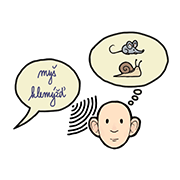Auditory memory is used for the information we hear; it is a type of short-term memory, which works with a specific type of information, i.e. the one that we remember by hearing.
Sometimes, individuals with dyslexia happen to have this kind of short-term memory weakened. Again, it is useful to train it, but at the same time it is good to know that you should not only hear whatever you need to remember, but also see it, or just write it down immediately or illustrate it for yourself in some other way, so you don’t have to rely only on auditory memory. Sometimes the situation is worse when it comes to remembering the information that you try to store mechanically, without logical connections (e.g. a shopping list, words in the language, listed words, a physical or chemical formula). However it is often easier to remember the data between which we can establish some logical connection, organize it so that it makes more sense, divide it into logical groups according to certain characteristics, their parent concept, similar sound, etc. Another form of support can be visualization of what we hear, that is imagining it, or just its symbolic illustration in the imagination using colors, shapes, etc.

Tip: If you don’t remember some words, try to imagine the information as pictures, symbols, colors, etc. – it might become easier to remember.